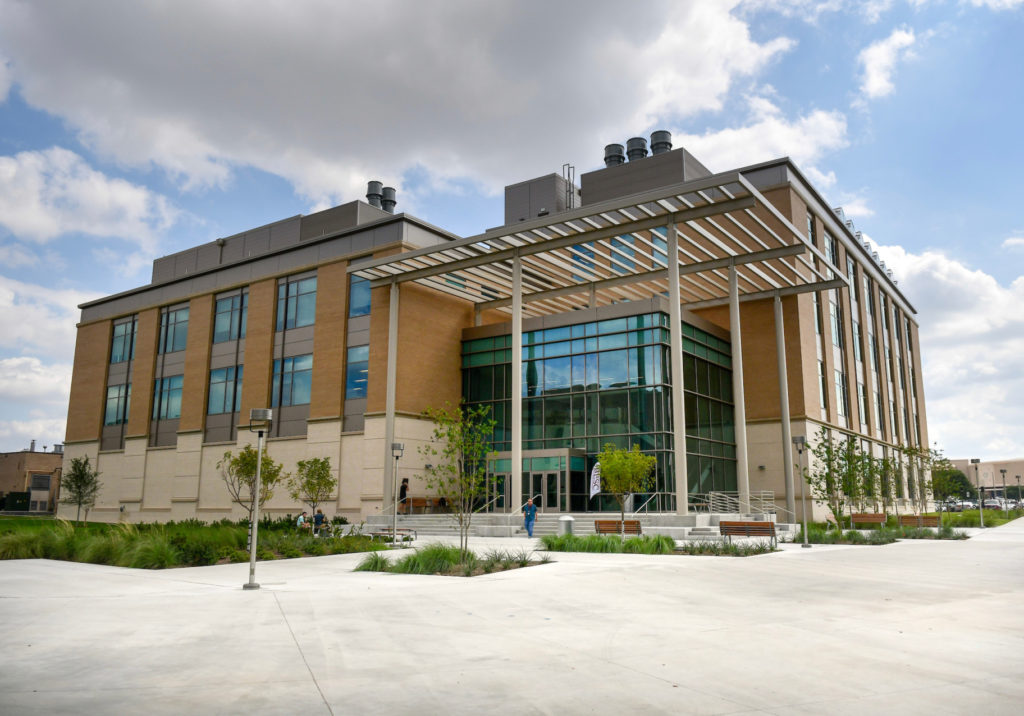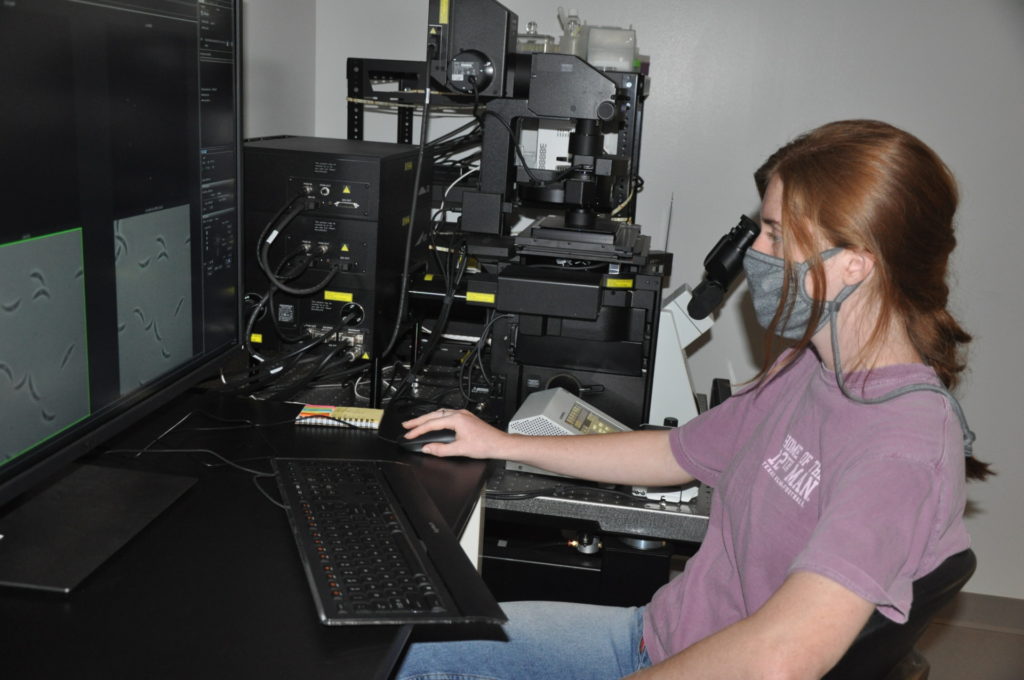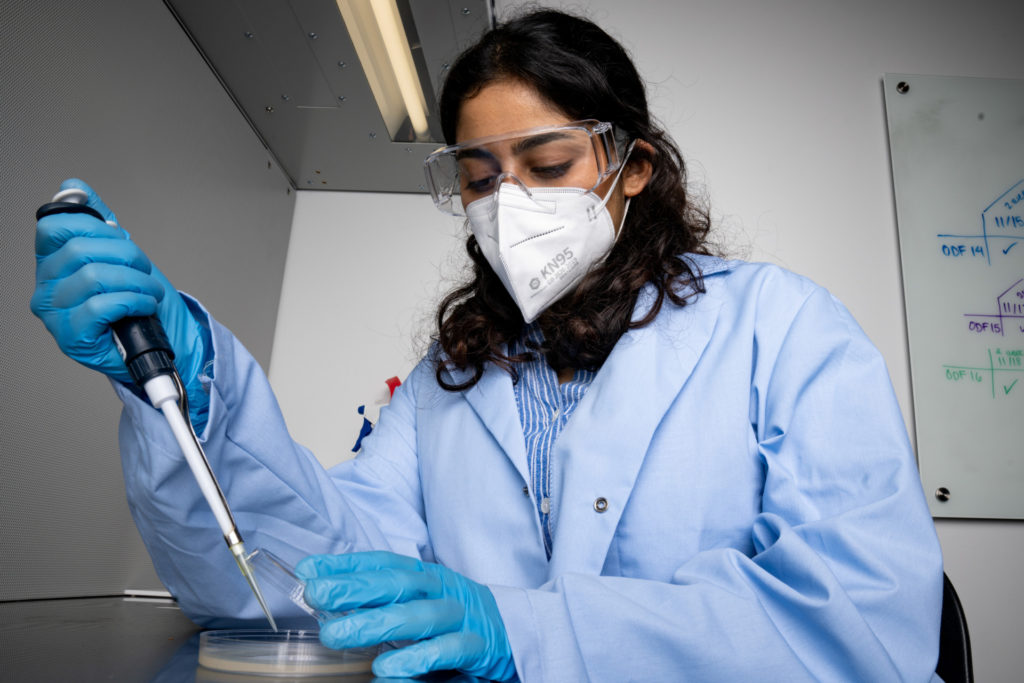Undergraduate research scholars advance bioenvironmental discovery
Students direct research projects in high-impact summer program
Some of the world’s most pressing bioenvironmental problems are being tackled by Texas A&M University students through a unique research program.

The Bioenvironmental Sciences Undergraduate Research Scholars program, BURS, is offered through the Bioenvironmental Sciences program, BESC, in the College of Agriculture and Life Sciences Department of Plant Pathology and Microbiology.
The immersive, hands-on program allows undergraduates to propose and direct innovative research and work alongside professors and graduate students in state-of-the-art laboratories.
BURS scholars gain laboratory experience and manage projects, communicate research results and participate in networking opportunities beyond those typically offered in traditional classroom coursework.
“BURS is the department’s answer to the need for highly skilled, next-generation scientists,” said Thomas Chappell, Ph.D., assistant professor in the Department of Plant Pathology and Microbiology and director of the BURS program.
“Our BESC degree program is diverse, and BURS projects have featured research on bioremediation, phytopathology, ecology and plant physiology,” Chappell said. “We work hard to make it a student-oriented experience, so it gives them an experiential view to what it’s like to be an investigator.”
Students apply for the program and write competitive research proposals as part of that application process. If selected, they serve as directors on a project over the summer, collaborating with a faculty member and graduate students in the leading-edge laboratories in the Plant Pathology and Microbiology Building.
Involved in hands-on research at all levels, each student receives a stipend, writes the deliverables for a project and presents the results at a symposium in the fall.
BURS scholars gain graduate-school-level experience
According to BESC major Hope Hancock ’22, the BURS program was the most valuable experience of her college career.
“We researched the attachment mechanisms for Colletotrichum graminicola, a fungal pathogen of corn,” Hancock said. “The spores of the pathogen attach to the plant and then germinate, causing disease. Understanding this attachment can one day help us know how to stop the disease.”

Hancock worked with Brian Shaw, Ph.D., professor in the Department of Plant Pathology and Microbiology, and collaborated with him in designing experiments and deciding what to test, experiences she would not have had in a regular classroom laboratory setting. Her research poster presentation at the BESC Symposium won first place.
She said she developed her communication and networking skills by sharing her research findings at the research symposium and visiting with BESC board members and environmental professionals from across Texas.
Her BURS project also helped Hancock decide that graduate school is a future goal after getting experience in an industry job.
“In Dr. Shaw’s lab, I worked with microscopes that had advanced imaging capacity,” Hancock said. “It showed me that I’m really into microscopy and fungal pathogens as opposed to bacterial or viral pathogens. My professors have been great mentors and helped me navigate what I want to do.”
BURS scholars can make better-informed decisions about their careers because they get the graduate school experience before committing to becoming a graduate student, Shaw said.
“But this is a benefit for the researchers as well because we get to interact with some of the best students in our undergraduate program,” Shaw said. “And it gives us a chance to interface with them in a one-on-one situation doing research.”
Finding the right path in the bioenvironmental sciences
Increasing her technical and decision-making skills through the program helped Mahima Yogesh ’22 gain confidence in her research abilities.
“I saw a huge improvement in the way I handle myself in a lab setting,” Yogesh said. “Not just the day-to-day tasks became easier, but the general confidence with which I did things, and that was all due to the BURS program.”

“It was nice to wake up and be excited to go into the lab, get back at it again and use the problem-solving part of my brain,” she said. “In the classroom, you can always ask somebody for an answer, but with research, that’s not always the case. So, it was a great experience.”
A bioenvironmental sciences major with a minor in oceanography, Yogesh is passionate about ocean conservation and plans to pursue a master’s degree in marine biology. She collaborated with Won Bo Shim, Ph.D., professor and associate department head of the Department of Plant Pathology and Microbiology, to study whether using microorganisms such as bacteria and fungi is a possible strategy to reduce and recycle plastic waste.
“Fungal plastic biodegradation research is in its infancy,” Shim said. “Establishing an efficient plastic waste biodegradation strategy using bacteria and fungi will be a game-changer in overcoming the mounting global environmental and health concerns.”
Shim said Yogesh was an energetic, enthusiastic student who “learned and matured so much as a researcher” during the three-month summer project.
“As an educator, the joy and gratification in seeing students grow are rewarding,” Shim said. “I encourage undergraduates to find out what they are passionate about. My job is to give them proper mentorship so they can find their path and succeed.”
Expanding options with BURS
When Kellie Votion ’18, a chemistry major, began a minor in bioenvironmental sciences and participated in the BURS program her senior year, her research and career possibilities opened up.
“As someone who previously didn’t work with life sciences, there were a lot of methods and tools I wasn’t as familiar with,” Votion said. “It gave me confidence in working in a professional environment that I don’t think I would have gotten before graduating had I not done an internship like BURS.”
Her BURS research project addressed the vital endocrinology of corn plants.
“My research studied the hormonal response the plant exhibited when it responded to stressors such as an insect feeding on the plant,” Votion said. “The introduction of the insect saliva to the plant increased its stress levels and its hormone level changed.”
Working with live specimens, raising insects and shucking corn to use in her research was something she would never have anticipated as a chemistry major that she would do.
Votion recalled that she made many friends and had fun with her BURS research group. And through the BURS program, she found her career path.
“It was after I joined the BESC program, did research with the BURS program and gained more exposure to microbiology that I learned what the biotech industry was, or that it even existed,” Votion said.
At the BESC Symposium, Votion learned about job opportunities in microbiology at FujiFilm Diosynth Biotechnologies, a pharmaceutical manufacturing company. She began her career there in the quality control department of a microbiology lab. She is now a technical writer for the company’s manufacturing group. This role allows her to work even more closely with the different facets of the organization, the manufacturing team and process, and clients.
Votion said she would encourage students to consider participating in BURS to take advantage of the opportunities it provides.
“Honestly, I wish I had gotten involved sooner than I did and that I could have done it more than one summer,” Votion said. To learn more about the BURS program and how to apply, visit https://tx.ag/BURSProgram.


